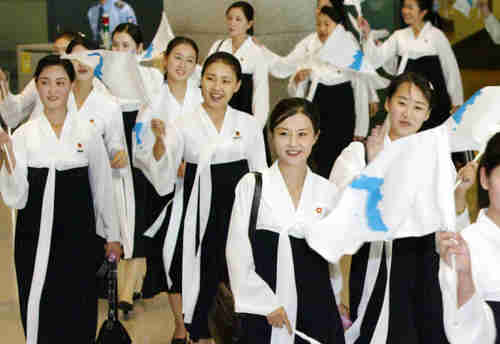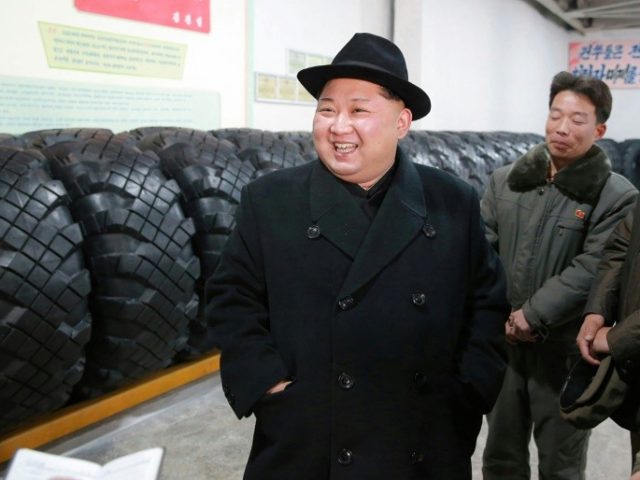This morning’s key headlines from GenerationalDynamics.com
- Kenya’s bitter rivals, Kenyatta and Odinga, become ‘brothers’ as Tillerson arrives
- The Donald Trump – Kim Jong-un meeting hinges on a decision that Kim has already made
Kenya’s bitter rivals, Kenyatta and Odinga, become ‘brothers’ as Tillerson arrives

Uhuru Kenyatta (L) and Raila Odinga shake hands, smile, and call each other ‘my brother.’ Odinga particularly seems to me to be gritting his teeth, as if he doesn’t want to be there. (Standard Media)
In a show of high theatre on Friday, Kenya’s president Uhuru Kenyatta, a leader of the dominant Kikuyu tribe, met with the opposition leader, Raila Odinga, who is also a leader of the Luo tribe. They surprised everyone by shaking hands at a press conference, and calling each other “my brother.”
Gone was the acrimony of last year’s election, which had to be rerun because Odinga accused Kenyatta of rigging the election, with violence that led to dozens of deaths. Gone was the vitriol and post-election violence of 2008, when Odinga lost to another Kikuyu, and the two tribes had weeks of bloody violence resulting in thousands of deaths.
At Friday’s love-fest, Odinga said:
The time has come for us to confront and resolve our differences. As we fight ostensibly to save ourselves from each other, the reality is, we need to save our children from ourselves.
Kenyatta said:
We had extensive discussions on matters Kenya and we had an agreement that the country is bigger than any of us. We have a responsibility as leaders to discuss our differences and what ails our country so that we get solutions.
Elections come and go, but Kenya remains. Our future as a country cannot be dictated by elections.
Together we want to build a united, harmonious nation where nobody feels left behind. We want to formulate a new beginning and have a country where we can differ in political alignments but united in matters Kenya.
We have moved from year to year, election to election, never pausing to deal with the challenges that our diversity was always going to pose to our efforts to create a prosperous and united nation. Consequently, the ties that bind us are today under the severest stress.
Kenyatta and Odinga have previously said that they would never talk to each other and shake hands, and they both refused to do so at a funeral this year. So what changed on Friday?
Late Friday, U.S. Secretary of State Rex Tillerson began a three-day visit to Kenya. Tillerson has been very critical of last year’s election in Kenya and has been calling for a reconciliation between the two leaders.
Kenya is one of the biggest recipients of economic aid from the U.S. Last year, the country received $1.1 billion in economic aid, and aid for other programs such as HIV and AIDS management, energy, and agriculture. The U.S. has also provided hundreds of millions more related to the fight against terrorism. Barack Obama, whose father was from the Luo tribe, had also worked hard to promote reconciliation in Kenya when he was president.
Tillerson seemed very pleased to see Kenyatta and Odinga shake hands:
This is a very positive step in our view, and while we know addressing Kenya’s ethnic and political divisions will take some time and effort, today both of these men showed great leadership in coming together. All the credit goes to the two leaders.
Kenya’s last generational crisis war was the Mau-Mau rebellion that climaxed in 1956. At that time, Kenya was a British colony, and the Mau-Mau rebellion was largely a fight against the colonists, with Luos and the Kikuyus fighting on the same side. History does not repeat itself, but it rhymes, and so now the Luos and Kikuyus are enemies of each other. The 2008 violence was not a full-scale war, and it fizzled quickly. But today, nine years later, a new generational crisis war is overdue, and with the British colonists long gone, it is feared that there will be a new full-scale crisis war between the Kikuyu, Kalenjin, and Luo tribes. Standard Media (Kenya) and The Nation (Kenya) and The Star (Kenya) and Standard Media (Kenya) and The Star (Kenya)
Related Articles
- Kenya cracks down on political opposition after mock inauguration (04-Feb-2018)
- Kenya’s Supreme Court issues ‘historic’ ruling, overturning presidential election (02-Sep-2017)
- Post-election massacre in Kenya raises concerns of tribal war (02-Jan-2008)
The Donald Trump – Kim Jong-un meeting hinges on a decision that Kim has already made

North Korea’s Army of Beauties (Korea Herald)
There are many questions being discussed in the mainstream media about the meeting between president Donald Trump and North Korea’s president Kim Jong-un. What are the time and place? Who has the advantage? Did Kim agree because of Trump’s military threats? Did Kim agree because of the sanctions? Or is the whole thing just a publicity stunt?
Reports are that Trump immediately accepted the invitation to meet without preconditions. I thought that this was a good negotiating ploy, since it is quite possible that Kim expected Trump to demand major preconditions first, such as the release of Americans being held captive in North Korea, and some steps taken towards denuclearization. I thought that Trump’s instant acceptance without preconditions would have been a surprise to Kim, who would then be faced with backing out of the meeting, or facing a meeting where he would be lectured to by Donald Trump.
However, by Friday, Trump backed off, and specified that some preconditions would have to be met, namely some “concrete and verifiable actions” in the direction of denuclearization. Apparently, Trump was responding to widespread criticism that he had given Kim something (agreeing to a meeting), while getting nothing in return. I do not agree with that analysis, but it is widely believed.
There is actually one and only one relevant question, and it has to do with a decision that has undoubtedly already been made by Kim: Has Kim’s government already decided to give up its nuclear weapons and ballistic missile development?
There are two possibilities:
- Kim has decided NOT to give them up. In that case, the entire meeting invitation is a publicity stunt, and a maneuver to stall for time to do further development. That will almost certainly end in war.
- Kim has already decided to give up nuclear and missile development. In that case, war will be averted.
Now, I am one of those people who believe that there is not a snowflake’s chance in hell that Kim is ready to give up nuclear and missile development.
But there is one scenario where I can imagine that it might happen, and it is something that I discussed during the Olympics in “12-Feb-18 World View — What was Kim Yo-jong thinking as she returned to North Korea from the Olympics?”
The North sent a huge delegation of hundreds of people to Seoul for the Olympics game. They included all the athletes, Kim Jong-un’s sister Kim Yo-jong, and the North’s “Army of Beauties” cheerleading squad.
During their visit, the girls in this “Army of Beauties” were carefully monitored, but they would still have had some opportunity to compare life in the South versus life in the North. Upon returning home, they would have told their boyfriends, husbands, and fathers how much better life is in the South and asked, “Why don’t we do what the South is doing?” After that, hundreds or thousands of people in North Korea’s capital Pyongyang might have been asking themselves the same question.
I realize that this whole scenario sounds fantastical, but it has happened before, and I personally remember it well. As I described in the article referenced above, this is exactly what happened when Russia’s Boris Yeltsin visited the United States in 1989. He visited a supermarket and was so affected by what he saw that he gave up communism. Here is how he explained it in his autobiography:
When I saw those shelves crammed with hundreds, thousands of cans, cartons and goods of every possible sort, for the first time I felt quite frankly sick with despair for the Soviet people. That such a potentially super-rich country as ours has been brought to a state of such poverty! It is terrible to think of it.
So very strange things sometimes happen. This scenario is so far-fetched that I would consider it completely impossible, except for the fact that I have seen it happen before.
At any rate, Kim’s government will already know whether it has decided to give up its nuclear weapon and ballistic missile development, so it already knows the likely outcome of the meeting with Trump. We probably will not know for some time to come. Washington Post and Korea Herald (11-Jan)
Related Articles:
- China angrily demands that the US retract the new North Korea sanctions (25-Feb-2018)
- US considers military options as North Korea continues nuclear weapons development during Olympics (21-Feb-2018)
- What was Kim Yo-jong thinking as she returned to North Korea from the Olympics? (12-Feb-2018)
- NY Times publishes a generational analysis of South Korea (30-Jan-2018)
- North Korea’s Olympics publicity stunt gains widespread media adoration (18-Jan-2018)
KEYS: Generational Dynamics, Kenya, Uhuru Kenyatta, Kikuyu, Raila Odinga, Luo, Rex Tillerson, Barack Obama, North Korea, Kim Jong-un, Russia, Boris Yeltsin
Permanent web link to this article
Receive daily World View columns by e-mail

COMMENTS
Please let us know if you're having issues with commenting.